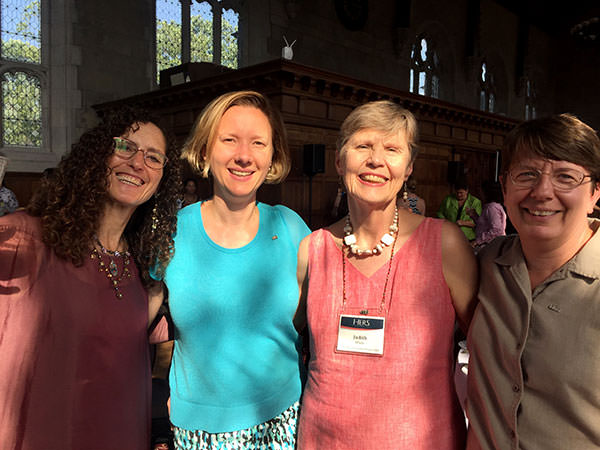Arts & Sciences faculty advance leadership skills at HERS Institute

Three College of Arts & Sciences faculty members are using the lessons they learned this summer to become better leaders in their roles on campus.
Drs. Dena Eber, digital arts faculty and graduate coordinator in the School of Art; Sheila Roberts, geology; and Carolyn Tompsett, psychology, participated in the 2016 Higher Education Resource Services (HERS) Bryn Mawr (Pa.) Summer Institute.
The annual institute, which encourages women to take leadership roles in higher education, helped each participant to better understand her leadership skills, improve her networking capabilities and increase awareness about the university.
“I wanted to do it for my department – geology – to learn how to work better with people,” Roberts said. “I learned to recognize different leadership styles and also how to look at situations from different perspectives.”
Roberts was also one of 18 women who participated in additional sessions as part of the HERS Luce Program for Women in STEM Leadership. They met to create a network for support and encouragement for women in STEM and to develop strategies for advancing a diverse cadre of women into STEM leadership roles.
Eber was looking for ideas to become a better leader and was thrilled to meet a woman whose approach matched her ideas. “Before HERS, I wasn’t sure if a feminine approach to leadership could be very effective,” she said. When one of the presenters stated, “When you care about people, magic can happen,” the philosophy clicked for Eber and gave her a perfect example that she could adapt for her own leadership style.
For Tompsett, the institute participants were the models for her ideas of leadership. “My idea of a leader was narrow for years,” she said, referring to her role in the department. “This experience opened my eyes to that I am part of a larger structure.”
Before leaving for the institute, the women interviewed senior officers in BGSU leadership positions, including President Mary Ellen Mazey, Chief Equity and Diversity Officer Barbara Waddell, Chief Financial Officer Sherideen Stoll, Vice President for Advancement Shea McGrew, Arts and Sciences Dean Raymond Craig, and Chief Marketing and Communications Officer David Kielmeyer. Those interviews helped them realize the depth and breadth of higher education beyond being a faculty member.
Eber, Roberts and Tompsett were struck by the need to address diversity and inclusion issues more on the campus. “We heard stories about offensive behaviors, where faculty felt unsafe; those are people we care about,” Tompsett recalled. “Social matters are important in our country. BlackLivesMatter will affect our campus, and we need to play a role in those issues and anticipate before they happen.”
The need to increase diversity in leadership is one of the projects the three are hoping to impact at BGSU. One of their missions is to reduce faculty communication gaps and initiate some of these important conversations.
Another common theme that emerged at HERS was the necessity to adapt to change. “As students change, we have to adapt and change the way we do things or die,” Roberts said. “I learned the number of students who are of traditional college age —18 to 22 — is decreasing. That makes us think: What are the ramifications for how we teach, how we reach a different population?”
Eber also believes an important issue for higher education is the need to be more sensitive to employees who are caregivers, whether it is for children, aging parents or other family members. “There needs to be a way to allow people to be caregivers and still be part of governing, teaching and learning, not having to wait until their kids are grown or their parents have passed.”
With the institute lessons fresh in their minds, the three are committed to staying in touch with their 64-women HERS network and with one another. They plan to hold one another accountable as they work on their leadership projects. At the end of the academic year they will evaluate and assess what they have accomplished and develop ongoing leadership goals.
They acknowledged their thanks to Craig for funding the opportunity and encouraging them to attend. “I have been aware of the HERS Institute for many years and believe in the importance of developing women in leadership roles in higher education,” Craig said.
“There were so many benefits, but for me, I have found confidence in ways that I didn’t have before,” Eber said.
Updated: 12/02/2017 12:37AM
